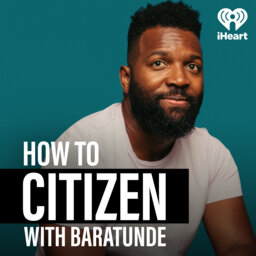Love is a Renewable Resource (Nsé Ufot)
We all know that voting alone won’t save democracy. But it does help…a lot. No one understands that better than voting rights organizer Nsé Ufot. She’s the former CEO of the New Georgia Project, where she leveraged technology and culture to register 600,000+ new voters. Nsé and Baratunde talk about why voting still matters and how we can bring love into the ways we citizen together.
SHOW ACTIONS
Internal Reflection - What Do You Love?
Take a moment to reflect on what you LOVE about your city, your county, or your country.
Now pause and breathe while visualizing those things for a few minutes. What do you feel in your body when you put your attention on what you love? How might this feeling help you citizen better?
Become Informed - Read bell hooks
Nsé mentioned this idea of a “love ethic” which she got from Black feminist author and activist bell hooks. Learn more by reading her book All About Love: New Visions (A Love Song to the Nation)
If you’ve only got time for a shorter read: we’ve found a beautiful blogpost that summarizes bell hooks’ love ethic.
Publicly Participate - Find Your People
There’s only ONE New Georgia Project, so if you live in Georgia, get involved with that organization. For those of us not blessed to live in the peach state, every region of the U.S. has similar groups focused on relational organizing work. Check out The Center For Popular Democracy for a great listing of affiliate organizations all around the U.S. you can get involved with.
You can also put relational organizing to work when it’s time to vote with organizations like CircleVoting or VoteForce.
SHOW NOTES
Check out our episode with Angela Lang to learn more about how we mobilize folks to politically engage in their community.
Find How To Citizen on Instagram or visit howtocitizen.com to join our mailing list and find ways to citizen besides listening to this podcast!
Please show your support for the show by reviewing and rating. It makes a huge difference with the algorithmic overlords and helps others like you find the show!
How To Citizen is hosted by Baratunde Thurston. He’s also host and executive producer of the PBS series, America Outdoors as well as a founding partner and writer at Puck. You can find him all over the internet.
CREDITS
How To Citizen with Baratunde is a production of iHeartRadio Podcasts and Rowhome Productions. Our Executive Producers are Baratunde Thurston and Elizabeth Stewart. Allie Graham is our Lead Producer and Danya AbdelHameid is our Associate Producer. Alex Lewis is our Managing Producer. John Myers is our Executive Editor. Original Music by Andrew Eapen and Blue Dot Sessions. Our Audience Engagement Fellows are Jasmine Lewis and Gabby Rodriguez. Special thanks to Joelle Smith from iHeartRadio and Layla Bina.
Additional thanks to our live audience voices Janine D., Diane H, Paula C. and Beatrice S.
In 1 playlist(s)
How To Citizen with Baratunde
How To Citizen with Baratunde reimagines the word “citizen” as a verb and reminds us how to wield ou…Social links
Follow podcast
Recent clips

When the Military Is in the Streets w Gen. Stan McChrystal
35:06

The true story of who we really are
05:41

We Know how to Rebuild Our Democracy - final story
08:08
 How To Citizen with Baratunde
How To Citizen with Baratunde